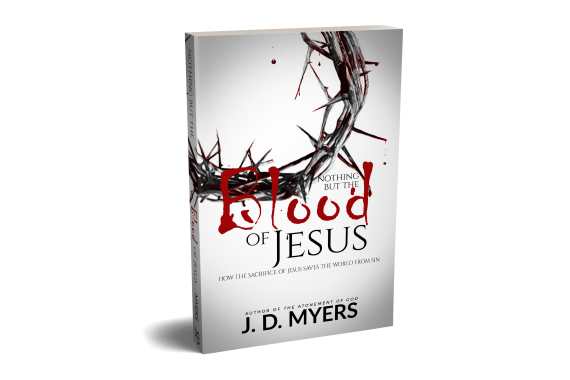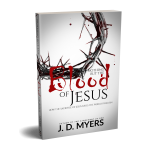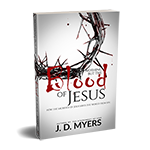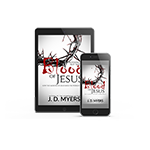Yesterday I announced that my new book has been published and is now available for purchase or download from Amazon. Here are the links if you want to get it (#AmazonAdLink) on the Kindle or (#AmazonAdLink) in Paperback.
In yesterday’s post, I gave the book description and the Table of Contents. The book also has a study guide, which makes this book an excellent resource for your small group Bible study, home group, or Sunday school class.

Nothing But the Blood of Jesus Study Guide
Below are discussion questions to help you study the concepts in this book. Each set of questions is based on one of the five key terms discussed in this book: Sin, Law, Sacrifice, Scapegoat, and Blood.
By reading through some of the questions below, you will get a feel for what sort of information I cover in the book, and what sort of questions get answered in the book.
Questions About Sin
1. How do most modern people define sin? What do we tend to think sin is?
2. How did many ancient people view sin? What did they tend to think sin was? Why did they think that blood could solve the problem of sin?
3. Most people today tend to view sin as breaking a law or command of God. This book proposes that such actions are little more than symptoms or signs of the greater problem identified in the Bible as “sin.” What is this “sin”?
4. When humans become “holy,” will we become more like God, or become more like the humans that God wants us to be? Why is this distinction important?
5. What do God’s instructions to Adam and Eve in Genesis 2 reveal about the way God wants humans to live? How about God’s instructions to the people of Israel in Exodus 20?
6. What do you think about the statement that sin is not necessarily breaking God’s commandments, but about engaging in violence and the things that lead to violence?
7. Near the beginning of the chapter “Scriptures on Sin,” what two truths are discussed about sin and God’s activity in response to sin?
8. Though sin may have been introduced by Adam and Eve in Genesis 3, when did sin actually “bear fruit” and what did this look like?
9. How can Paul claim to have faultlessly kept the entire law, but also be the chief of sinners?
10. Why does God want humans to refrain from sin? Is it because He is so deeply hurt and offended by sin that He just cannot stand to be around sinners? Or is it because He loves us so much, He does not want to see us hurt and damaged by sin?
Questions About Law
1. What is the law for?
2. What is lacking in the law?
3. Why are laws given? Why do laws only increase over time?
4. How can the law lead us into greater sin?
5. Why is obeying the law not the answer to our problem of sin?
6. What is it that God really wants from us?
7. Why did God give the law, when He knew it wouldn’t work?
8. According to Paul, what is the purpose of the law?
9. What does the Sermon on the Mount focus our attention on?
10. Why do you think Jesus said that His disciples will be known by their love, rather than by their law keeping?
Questions About Sacrifice
1. What are the three purposes of sacrifice? Describe the differences between the three.
2. What are humans trying to fix or correct when we offer sacrifices?
3. Regardless of our religion or heritage, who are humans trying to appease with our sacrifices?
4. If God truly did demand sacrifices from us, how is He any different from the other gods that require sacrifices? In other words, since sacrifices “work” everywhere they are performed (regardless of religion), what does this mean about the sacrificial instructions in the Bible?
5. Can God be in the presence of sin? If you answer “No,” how could the killing of an animal (or a person) make a difference in God’s ability to be near sinners? Also, how could Jesus be fully God and yet live here on earth?
6. If there is no sacrifice for intentional sin, how does God “take care” of these sins? Do you think God also “takes care” of unintentional sins the same way?
7. What did the chapters on sacrifice begin to reveal about why Jesus died on the cross? Was His sacrifice for the purpose of pleasing and appeasing God? Why or why not?
8. Why does the Bible contain so much information and teaching about sacrifice and violence?
9. When is the first sacrifice performed in the Bible?
10. Why are sacrifices not the solution to sin?
Questions About Scapegoating
1. What are the five stages of the “scapegoat mechanism”?
2. How does rivalry lead to violence?
3. Why is a scapegoat needed to end violence?
4. If the scapegoat is relatively innocent (or at least, not completely guilty of everything for which they are charged), why does their death create peace between two warring sides?
5. What is the better way of creating peace between two parties?
6. What are the three types of scapegoat? Why do they make good scapegoats?
7. What are the three signs of scapegoating?
8. How is it that we humans “scapegoat” God?
9. What are the three ways that Jesus reveals scapegoating?
10. What does Jesus reveal about scapegoating in regard to God and in regard to humanity?
Questions About Blood
1. What have these chapters on blood (as well as previous chapters) revealed about the death of Jesus in relation to the wrath of God? In other words, did Jesus die to appease the wrath of God? Why or why not?
2. What does the bloody crucifixion of Jesus reveal to us?
3. Why did the crucifixion of Jesus need to be bloody and violent?
4. What does the law of God do for violence?
5. If it was not God who forced His Son to die on a cross, who (or what) put Jesus on the cross, and why?
6. The rationale behind sacrifice is that the taking of one life saves many others. Why and how is this false?
7. Why did Jesus submit Himself to the “scapegoat mechanism”? What does His death as a scapegoat victim reveal to us?
8. What is the only kind of sacrifice God calls each of us to practice?
9. God promises to always give us a way of escape from sin. How does Jesus dying on the cross reveal to us the way of escape from our own sinful scapegoating tendencies?
10. How does the violent death of Jesus on the cross save us from our sin?
Buy the book on Amazon today:
Whether you want to buy one book for yourself, or multiple books for your church study group, you can get the book on Amazon. Here are the links for paperback and Kindle editions. Just click the image for the edition you prefer.






Jeremy this looks like an insightful look into God’s own sacrifice of Self and into love’s topography of grace, themes which are rich in your always-helpful works thus far. Looking forward to reading this and am very appreciative of your content. Awesome stuff :-}
Are there printed answers online to these questions?
No. Sorry! They are really just discussion questions based on the content of the book.